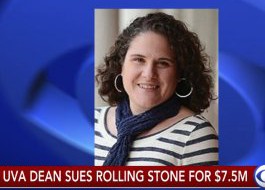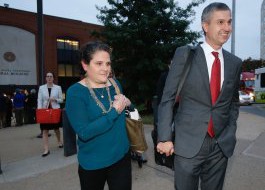
Nearly two years after Rolling Stone was greeted with condemnation for its since-retracted article about a brutal rape at the the University of Virginia, the publication is bracing for a defamation trial set to begin on Monday. Tensions are running high for the parties involved in UVA dean Nicole Eramo's lawsuit, and now, the publication's lawyers are worried they won't get a fair trial because ABC's 20/20 will be featuring the case and an interview with Eramo on Friday.
On Monday, Rolling Stone told a Virginia federal judge in an emergency motion that Eramo's side "intentionally leaked copies of video depositions," including one showing Sabrina Rubin Erdley, the author of the controversial rape story, crying during pre-trial testimony. ABC is promoting the episode in a trailer that states, "Now, for the first time, those at the center of the scandal, speak."
"[U]ndoubtedly, many citizens in the Charlottesville Division will watch this sensationalized television broadcast about the University located in their backyard, or will access the program online," states W. David Paxton, attorney for Rolling Stone in court papers. "In the aftermath, seating an impartial jury in Charlottesville will be difficult, if not impossible."
Rolling Stone is now demanding that Eramo be held in contempt and that she shouldn't be able to use any deposition testimony at trial. The publication has asked ABC to refrain from using the video recordings, but if the show airs as scheduled, Rolling Stone is also asking the judge to transfer the case to another district and postpone the trial.
The development marks the latest twist in a case that's received close attention and has millions of dollars on the line.
Eramo is suing over an article that presented the brutal rape of a freshman, identified as "Jackie." The story described how Jackie was invited to a date party at the Phi Kappa Psi fraternity, where she was led to a pitch-black room upstairs, tackled through a glass table, punched in the face and gang raped for three hours by seven men.
According to Eramo, she's been cast as the "chief villain" of the story for purported efforts to persuade Jackie not to report the rape. The Dean asserts that her reputation has been tarnished by an article that triggered an investigation by the Columbia Journalism School before it was retracted four months after being published in November 2014.
 Nicole Eramo. Screenshot Via YouTube
Nicole Eramo. Screenshot Via YouTube
At trial, Rolling Stone will be looking to defend itself by asking the jury to interpret some of the article's statements, including that Eramo "silenced" Jackie or "discouraged" her from reporting her gang-rape to the police, as either opinion or exaggerated rhetoric, based on a reading of UVA's sexual assault policies, and not susceptible to a defamatory meaning.
On summary judgment, U.S. District Court judge Glen Conrad decided that the statements could reasonably be interpreted to assert factual connotations regarding Eramo, though held back in deeming the statements to be defamatory per se.
Among other things, Eramo will still need to show that the statements in question including ones directed at the administration at large were "of and concerning" her and that she was damaged.
Additionally, Conrad has found Eramo to be a limited-purpose public figure, meaning she will have to prove the magazine acted with actual malice to prevail on her defamation claims.
Rolling Stone has argued Eramo will be unsuccessful in showing the publication believed the challenged statements in the article to be false. "To the contrary, the undisputed evidence shows that Defendants firmly believed – and still believe today – that the Article’s reporting on Eramo and UVA’s handling of sexual assault reports is accurate and well-substantiated," stated a summary judgment motion.
Conrad will let a jury decide and believes there's enough of a possibility for Eramo to clear the actual malice hurdle. In allowing the case to get to trial, he pointed to potential evidence possibly showing a jury that Sabrina Rubin Erdley had a preconceived story line and may have consciously disregarded contradictory evidence; evidence suggesting that Ederly should have further investigated Jackie's allegations; evidence suggesting that Ederly had reasons to doubt Jackie's credibility; that at least three individuals advised the writer that her portrayal of Eramo was inaccurate; that deposition testimony could lead a jury to believe Ederly harbored ill will for Eramo or intended to injure the administration; and finally, evidence about the events between the publication and Rolling Stone's apology in an editor's note a couple weeks later.
But will the trial really take place next week?
Rolling Stone is demanding sanctions and a postponement over an alleged release of confidential deposition testimony to 20/20, but Eramo's lawyer, Elizabeth Locke, denies any violation of the secrecy imposed on the case.
"There is no 'Emergency,'" she writes. "Defendants’ Motion rests entirely on speculation, a misconstruction of the relevant law, and an erroneous and tortured reading of the Court’s Protective Order."
Specifically, Eramo's attorney doesn't believe there's any automatic restriction on the disclosure of videotapes of depositions, and that the videos only express transcripts already part of the public record.
That's not good enough for Rolling Stone, worried about the tainting of a jury that has yet to be seated.
"There is a vast difference between the public release of deposition transcripts and video testimony," the publication tells the judge. "The latter – due to the nature of the video medium – engenders a much greater risk of abuse, harm, and embarrassment. This is already evident here, as ABC chose for its promotional trailer a public display of Erdely at her most vulnerable moment."
Read the original article on The Hollywood Reporter. Copyright 2016. Follow The Hollywood Reporter on Twitter.




